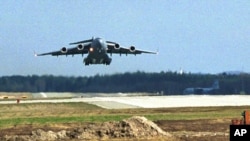The World Food Program reports increasing conflicts in the first half of this year have created a huge surge in emergency airlifts and airdrops of food to people caught in hard-to-reach areas. The air service run by WFP says it has had to deliver 50 times more food by air this year compared to the same period last year to tackle multiple global emergencies.
Since the beginning of the year, UNHAS, the U.N. Humanitarian Air Service, has delivered some 7,600 tons of food as well as more than 1,000 tons of relief supplies and equipment for the World Food Program and other humanitarian organizations to 21 countries.
WFP reports more than 90 percent of the supplies were delivered to the Central African Republic, South Sudan and Syria. All three of these places are in the midst of conflicts which have displaced millions of people and cut off communities from sources of aid.
That is where UNHAS comes in. This U.N. service transports food and other relief supplies by air to people cut off from normal road and river traffic.
WFP Aviation Chief Cesar Arroyo says it has become necessary to deliver food to people in three areas in the northern part of South Sudan this year because of the conflict and lack of road access because of heavy rain.
He tells VOA more than three million people in South Sudan are in need of food, with nearly half that number out of easy reach and in critical need.
“Now, if you are asking me what would happen if we are not able to reach them, eventually as you have this issue of lack of food, lack of sanitation, the rainy season coming, the malaria, the cholera - altogether it is a disaster. It is a combination for disaster. …We have thousands of people working every day in trying to deliver these needs to northern areas of South Sudan. But, the repercussions of lack of access to deliver, they would be dramatic," said Arroyo.
Costly aid
Arroyo says it is about six to eight times more costly to deliver food and other relief supplies by air than by road. He figures the cost of emergency air transport in South Sudan at $1 billion a year. For Syria, another complex emergency, he says the cost is about $40 million a year.
He says airdrops are far more complex and expensive than airlifts, which explains the difference in cost. He says airlifts are carried out when aircraft can safely land to unload humanitarian supplies. And, this is possible in Syria.
He says UNHAS is starting an airlift Tuesday in Syria. He says 20 planes over a period of time, carrying food and other supplies will take off from the capital, Damascus, for Qamishli in northeastern Syria. After the planes are unloaded at the airport, he says the supplies will be transported by road to different rebel-held areas.
He says it is not easy to negotiate the delivery of relief supplies to those displaced by the war.
“One day, it is a rebel area and the next day it is held by another rebel group…so you have two, three rebel groups. So, you go and deal with one and they say yes, the corridor is approved. Then you go there, but next day you have a different rebel group. So, the situation gets so complex…By now, every day or every other day or every week, you have to talk to different people, different rebels. So, this is a complex emergency," he said.
Targeting displaced persons
Arroyo says the food in Tuesday’s airlift is destined for 50,000 displaced people in al-Hasakah governorate who are in urgent need of food.
He says the situation in northern Iraq also is becoming more desperate for people displaced during an offensive by Sunni Islamist insurgents.
Hundreds of thousands of people have fled Mosul to Irbil in Kurdistan since insurgents seized the city in June.
Arroyo says UNHAS will have to begin airlifts to Mosul and Irbil as road conditions become more insecure. He says the agency currently is airlifting food and relief items into Irbil from Baghdad and Dubai.










